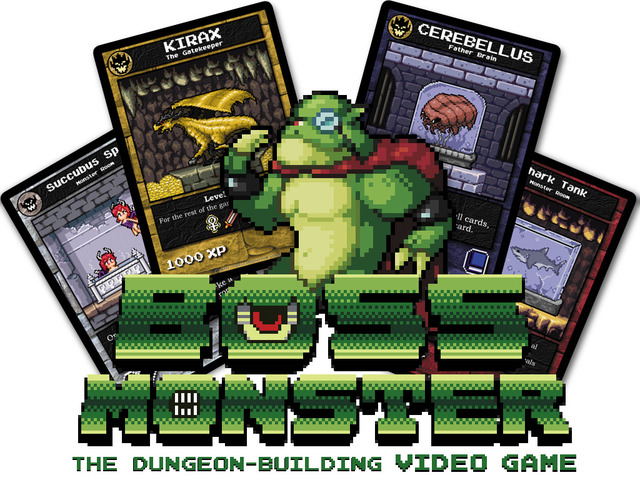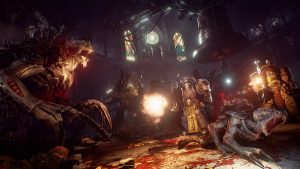Before the word gaming became synonymous with sitting in front of a computer screen and clicking buttons, it usually meant that friends and family were gathered around a table rolling dice, writing on sheets of paper, and moving little plastic pieces around a board. Brothers Chris and Johnny O’Neal are now attempting to bridge those gaming worlds by creating a digital version of their hit board game, Boss Monster.
Back in 2012 the tabletop game developing duo that comprise Brotherwise Games announced the original Boss Monster on Kickstarter. The concept was simple. Players selected a unique retro game inspired Boss Monster as their character and built a deadly dungeon for them in order to lure and slay as many reckless heroes as they could. After acquiring over $200,000 in funding for their original $12,000 goal, it was clear that players were interested in the retro styled artwork and humorous premise.
Since then the game was successfully released and became a favorite of game nights almost immediately. Now available for purchase in retail stores and online, Brotherwise Games began to consider how they might further Boss Monster’s reach and availability.
In August of this year Chris and Johnny O’Neal announced another Kickstarter campaign, this time for the digital version of Boss Monster. Also successfully funded, Boss Monster Digital was backed for just under $150,000 for the original $85,000 goal, and is set to be developed for PC (Steam), iPad, and android devices.
Due to the success of the tabletop version, and the excitement brewing for the digital version, we sat down with Chris O’Neal to learn more about how this board game will make its shift to a digital platform.
Jesse Tannous: Did you develop the physical version of Boss Monster to be able to convert it into a video game from the beginning?
Chris O’Neal: Actually, we didn’t. Boss Monster evolved pretty organically during a game design “competition” between the two of us. The first brother to get to a working prototype of a game got a beer, or something like that, from the other brother. The idea that the game designed would be such a hit, much less one we’d be turning into a video game, wasn’t something we were thinking about at the time.
JT: Tell me about the development team you’ve contracted to create the game, how did that partnership form?
CN: Plain Concepts is an app and video game developer from Spain. We took proposals from a number of different companies in an open process that we advertised in a number of venues. We were impressed by Plain Concepts’s passion for the game, the quality of their previous products, and the number of people they were willing to devote to the development process. Taking on a project like this one that was going to be contingent on a successful Kickstarter was a big risk for them, but we’re glad they took that risk!
JT: What would your advice be to other board or card game developers who might consider doing a digital version of their game?
CN: The digital environment provides some terrific possibilities for board games, and digital versions can bring players who otherwise wouldn’t have picked up a board game to the gaming table. If the fit is right for a digital version, we’d encourage publishers and designers to think seriously about it. Where the rubber hits the road, however, is with your development partner. Find someone who is as passionate about your game as you are. Games, perhaps more than any other project, really echo the love that went into them. If you’re developers are building the game as a job, instead of a passion project, your players will be able to sense that.
JT: What are some of the biggest things you can accomplish with the video game version of Boss Monster than you can’t with the tabletop version?
CN: Boss Monster was designed to be a “cards-only” game. When we were designing it we were really attracted to the idea of a game that wasn’t burdened by additional components like dice and counters. But with Digital Boss Monster, we thought it would be silly not to take advantage of the digital environment and the additional capabilities that a computer working in the background combines. So players of Digital Boss Monster are going to see some new rooms and bosses and that have random damage and effects, acquire +1 counters, and do other things that the tabletop version doesn’t have. This should provide some new play experience for Boss Monster veterans.
JT: Has any consideration already gone into integrating the two experiences or providing cross-platform rewards like physical cards with promotional codes for the video game?
CN: Yes, indeed! We’re actually creating tabletop versions of all the new digital cards. These were one of the additional rewards for the digital version Kickstarter backers, but they will also be available for sale later in 2015!
Whether tabletop or video gaming is your preference Brotherwise Games seems to be trying everything they can to make Boss Monster an experience you can enjoy.



